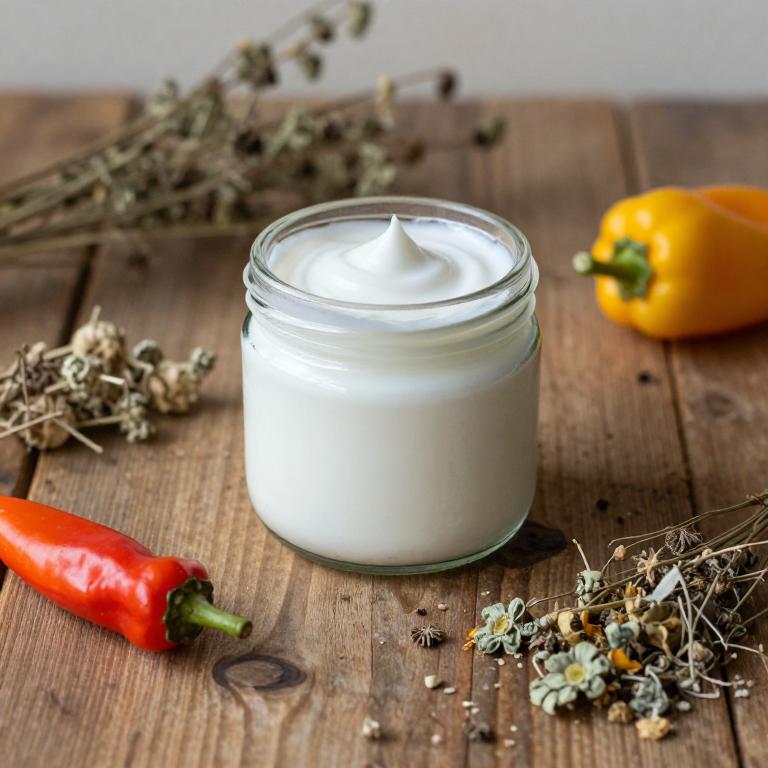10 Best Herbal Creams For Nerve Pain

Herbal creams for nerve pain are topical treatments that combine natural ingredients with therapeutic properties to alleviate discomfort associated with conditions like neuropathy, sciatica, and fibromyalgia.
These creams often contain ingredients such as capsaicin, arnica, eucalyptus, and ginger, which are known for their anti-inflammatory, analgesic, and circulatory benefits. They work by reducing inflammation, improving blood flow, and stimulating sensory receptors to block pain signals. Unlike prescription medications, herbal creams are generally considered safer with fewer side effects, though they may not provide immediate relief for severe cases.
Many people prefer them as a complementary or alternative approach to managing nerve pain naturally.
Table of Contents
- 1. St. john's wort (Hypericum perforatum)
- 2. Bell pepper (Capsicum annuum)
- 3. Ginger (Zingiber officinale)
- 4. Yarrow (Achillea millefolium)
- 5. Chaste tree (Vitex agnus-castus)
- 6. Salvia (Salvia officinalis)
- 7. Ginkgo (Ginkgo biloba)
- 8. English lavender (Lavandula angustifolia)
- 9. Turmeric (Curcuma longa)
- 10. Aloe vera (Aloe barbadensis)
1. St. john's wort (Hypericum perforatum)

Hypericum perforatum, commonly known as St. John's Wort, is a herbal remedy that has been traditionally used for its potential analgesic and anti-inflammatory properties.
When formulated into creams, it may offer localized relief for nerve pain by reducing inflammation and modulating pain signals in the affected area. These creams are often favored for their natural composition, making them a popular alternative for individuals seeking non-pharmacological treatments. However, it is important to note that the effectiveness of hypericum perforatum creams can vary, and they may interact with certain medications, so consultation with a healthcare provider is recommended.
Overall, while some studies suggest potential benefits, more rigorous clinical research is needed to fully establish their efficacy for nerve pain management.
2. Bell pepper (Capsicum annuum)

Capsicum annuum, commonly known as chili pepper, is the primary ingredient in many herbal creams used for the relief of nerve pain.
These creams work by delivering capsaicin, a potent compound that depletes substance P, a neurotransmitter involved in transmitting pain signals. When applied topically, capsaicin creates a warming sensation that can help reduce inflammation and desensitize nerve endings, thereby alleviating discomfort. However, initial use may cause a stinging or burning sensation, which usually subsides as the skin becomes accustomed to the treatment.
Capsicum annuum herbal creams are often recommended as a natural alternative for managing conditions like neuropathy, sciatica, and arthritis-related nerve pain.
3. Ginger (Zingiber officinale)

Zingiber officinale, commonly known as ginger, has been traditionally used for its anti-inflammatory and analgesic properties, making it a popular ingredient in herbal creams for nerve pain.
These creams often contain ginger extract, which may help reduce inflammation and alleviate discomfort associated with conditions like neuropathy or postherpetic neuralgia. The active compounds in ginger, such as gingerols and shogaols, are believed to stimulate blood circulation and block pain signals, providing natural relief. While some studies suggest that topical ginger applications can offer temporary pain relief, more research is needed to fully understand its efficacy for chronic nerve pain.
As a complementary therapy, ginger-based creams may be used alongside conventional treatments to manage symptoms in a holistic approach.
4. Yarrow (Achillea millefolium)

Achillea millefolium, commonly known as yarrow, has been traditionally used in herbal medicine for its anti-inflammatory and analgesic properties.
When formulated into creams, it may provide relief for nerve pain by reducing inflammation and soothing irritated nerves. The active compounds in yarrow, such as flavonoids and essential oils, are believed to support nerve health and reduce pain signals. These creams are often used as a natural alternative for individuals seeking to manage conditions like neuropathy or post-herpetic neuralgia.
However, it is important to consult a healthcare provider before using yarrow-based products, especially for those with known allergies or chronic health conditions.
5. Chaste tree (Vitex agnus-castus)

Vitex agnus-castus, commonly known as chaste tree berry, has been traditionally used in herbal medicine for its potential soothing properties.
When formulated into creams, these herbal products may offer relief for nerve pain by reducing inflammation and promoting nerve health. The active compounds in vitex, such as flavonoids and lignans, are believed to support the nervous system and alleviate discomfort. While some studies suggest its efficacy, more clinical research is needed to fully confirm its benefits for nerve pain.
As with any topical treatment, it is advisable to consult a healthcare professional before use, especially for individuals with existing medical conditions or those taking other medications.
6. Salvia (Salvia officinalis)

Salvia officinalis, commonly known as sage, has been traditionally used for its medicinal properties, and recent studies suggest that sage-based herbal creams may offer relief for nerve pain.
These creams often contain extracts from the leaves of the plant, which are rich in compounds like rosmarinic acid and flavonoids, known for their anti-inflammatory and antioxidant effects. When applied topically, these creams may help reduce inflammation and soothe irritated nerves, providing targeted relief for conditions such as neuropathy or postherpetic neuralgia. However, while some users report positive results, more clinical research is needed to fully understand their efficacy and safety.
As with any topical treatment, it is advisable to consult a healthcare professional before use, especially if you have sensitive skin or are taking other medications.
7. Ginkgo (Ginkgo biloba)

Ginkgo biloba herbal creams are topical treatments that contain extracts from the ginkgo tree, known for their potential to improve blood circulation and reduce inflammation.
These creams are often used to alleviate nerve pain, such as that experienced in conditions like neuropathy or sciatica, due to the antioxidant and anti-inflammatory properties of ginkgo biloba. The active compounds in ginkgo, including flavonoids and terpene lactones, may help enhance nerve function and reduce discomfort. While some users report relief from applying these creams, their effectiveness can vary, and it is advisable to consult a healthcare professional before use.
As with any herbal remedy, ginkgo biloba creams should be used cautiously, especially for individuals with allergies or those taking other medications.
8. English lavender (Lavandula angustifolia)

Lavandula angustifolia, commonly known as English lavender, is often used in herbal creams to alleviate nerve pain due to its soothing and anti-inflammatory properties.
These creams typically contain essential oils extracted from lavender flowers, which are known to have a calming effect on the nervous system. The active compounds in lavender, such as linalool and linalyl acetate, may help reduce inflammation and promote relaxation, which can ease discomfort associated with conditions like neuropathy. When applied topically, lavender-based creams can provide localized relief without the systemic effects of oral medications.
As a natural remedy, these creams are increasingly popular for their gentle yet effective approach to managing nerve pain.
9. Turmeric (Curcuma longa)

Curcuma longa, commonly known as turmeric, contains curcumin, a compound renowned for its anti-inflammatory and antioxidant properties.
Herbal creams infused with curcuma longa are increasingly used to alleviate nerve pain due to their ability to reduce inflammation and oxidative stress, which are often associated with conditions like neuropathy. These creams provide a topical application method, allowing the active compounds to be absorbed through the skin and target the affected nerves directly. While they may not replace conventional treatments, they can serve as a complementary therapy to manage symptoms and improve overall comfort.
However, it is important to consult a healthcare professional before using these creams, especially if you have underlying health conditions or are taking other medications.
10. Aloe vera (Aloe barbadensis)

Aloe barbadensis, commonly known as aloe vera, is often incorporated into herbal creams for its soothing and anti-inflammatory properties, which may offer relief for nerve pain.
These creams typically combine aloe vera with other natural ingredients like camphor, menthol, or capsaicin to enhance their effectiveness in reducing discomfort and inflammation. The moisturizing and regenerative qualities of aloe vera can help soothe irritated skin and support nerve healing, making it a popular choice for those seeking natural remedies. While scientific evidence on its efficacy for nerve pain is limited, many users report anecdotal benefits, suggesting potential therapeutic value.
As with any topical treatment, it is advisable to consult a healthcare professional before use, especially for chronic or severe nerve pain conditions.